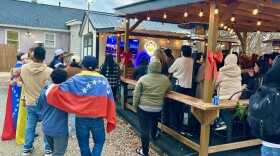Many cultures mark the end of childhood with a rite of passage. And for many Latinas, the transition from girlhood to womanhood often includes a giant party – the quinceanera. A growing number of Mexican families in the Triangle are keeping that tradition alive despite how costly these lavish events can be for low-wage workers. And for the teenagers being feted, the whole experience can make them feel both connected to their heritage and extended family, and like helpless victims of their mothers’ projections.
A new six-part series called "¡FIESTA! Quinceañera" documents three of these girls, their families and their photographers as they prepare for and enjoy their big days. Guest host Anita Rao talks with co-director and co-producer Rodrigo Dorfman and Juana (first name only to preserve privacy), one of the girls featured in the series, about what these quinceaneras show about immigrant life in North Carolina today. “¡FIESTA! Quinceañera” premiered on the YouTube Storycast channel on July 24. A 7-10 minute episode will be added weekly until August 28.
INTERVIEW HIGHLIGHTS
Rodrigo, on the significance of the quinceañera:
It's a rite of passage at its essence. The 15-year-old girl is now coming out into the world as a woman... There's a Mexican proverb that says, “A girl at 14, a woman at 15." So going beyond all the, let's say, patriarchal baggage that comes with it, there's a lot going on. The form of it takes the gifts of shoes, so the girl begins wearing tennis shoes, but then she has high heels. And then she gets a cross sometimes, if she's Catholic. She also will get her last toy — which is usually a doll — that looks exactly like her, wearing the dress. And that's it. It's your last toy, enjoy it, and now you've got to be an adult.
Juana, on her mom's role in her quinceañera:
My mom, she is a very important person in my life. And at 15, she had everything prepared for her party. She had her dress. She had her shoes. She was ready to go. But her dad, unfortunately his job went bad, and he didn't get the money he was supposed to get and unfortunately she couldn't have her party. So, through me, she lived her 15, and she tried deciding on what she wanted for me that she couldn't have in hers.
Juana, on experiencing culture clash:
At the end of the day I felt like it was still more on the Hispanic/Mexican side. Because obviously you have to have the traditional mass, your godparents, the dress, even including the music that's going to be played at your party is mostly in Spanish. And I thought that that was kind of a problem because my mom and I couldn't agree, because I wanted more of my American side, and she wanted more of her Mexican side. And we had a lot of arguments trying to figure out what exactly we wanted. But at the end of the day she won, and she got her Mexican side.
Rodrigo, on the quinceañera in the "Nuevo South"
I think what's interesting about what we're living today in the "Nuevo South" and in North Carolina with Latino immigration is that we're experiencing also a new culture. And so in many ways, there's a new culture of the quinceañera that is being birthed. That is coming to be right here. Because it's an immigrant culture. So in some ways there's echos of what it could look like in Mexico, but it's not. It's a different flavor. Different ways of expressing it ... What we're witnessing is just a whole new set of cultural traditions that are coming together, and it's full of fantasy, and it's full of American idioms and pop culture and Mexican — it's something new. It's very fresh, and I'd never seen anything like it.











